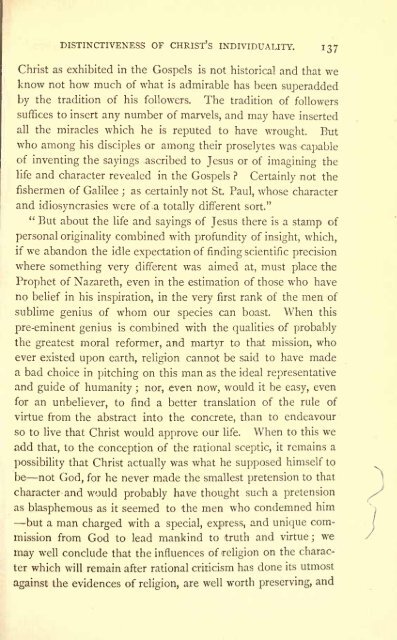John Stuart Mill: A Criticism with Personal Recollections
John Stuart Mill: A Criticism with Personal Recollections
John Stuart Mill: A Criticism with Personal Recollections
You also want an ePaper? Increase the reach of your titles
YUMPU automatically turns print PDFs into web optimized ePapers that Google loves.
DISTINCTIVENESS OF CHRIST S INDIVIDUALITY. 137<br />
Christ as exhibited in the Gospels is not historical and that we<br />
know not how much of what is admirable has been superadded<br />
by<br />
the tradition of his followers. The tradition of followers<br />
suffices to insert any number of marvels, and may have inserted<br />
all the miracles which he is reputed to have wrought. But<br />
who among his disciples or among their proselytes was capable<br />
of inventing the sayings ascribed to Jesus or of imagining the<br />
life and character revealed in the Gospels ? Certainly not the<br />
fishermen of Galilee ; as certainly not St. Paul, whose character<br />
and idiosyncrasies were of .a totally different sort."<br />
"<br />
But about the life and sayings of Jesus there is a stamp of<br />
personal originality combined <strong>with</strong> profundity of insight, which,<br />
if we abandon the idle expectation of finding scientific precision<br />
where something very different was aimed at, must place the<br />
Prophet of Nazareth, even in the estimation of those who have<br />
no belief in his inspiration, in the very first rank of the men of<br />
sublime genius of whom our species can boast. When this<br />
pre-eminent genius is combined <strong>with</strong> the qualities of probably<br />
the greatest moral reformer, and martyr to that mission, who<br />
ever existed upon earth, religion cannot be said to have made<br />
a bad choice in pitching on this man as the ideal representative<br />
and guide of humanity ; nor, even now, would it be easy, even<br />
for an unbeliever, to find a better translation of the rule of<br />
virtue from the abstract into the concrete, than to endeavour<br />
so to live that Christ would approve our life. When to this we<br />
add that, to the conception of the rational sceptic, it remains a<br />
possibility that Christ actually was what he supposed himself to<br />
be not God, for he never made the smallest pretension to that<br />
character and would probably have thought such a pretension<br />
as blasphemous as it seemed to the men who condemned him<br />
but a man charged <strong>with</strong> a special, express, and unique com<br />
mission from God to lead mankind to truth and virtue; we<br />
may well conclude that the influences of religion on the charac<br />
ter which will remain after rational criticism has done its utmost<br />
against the evidences of religion, are well worth preserving, and

















